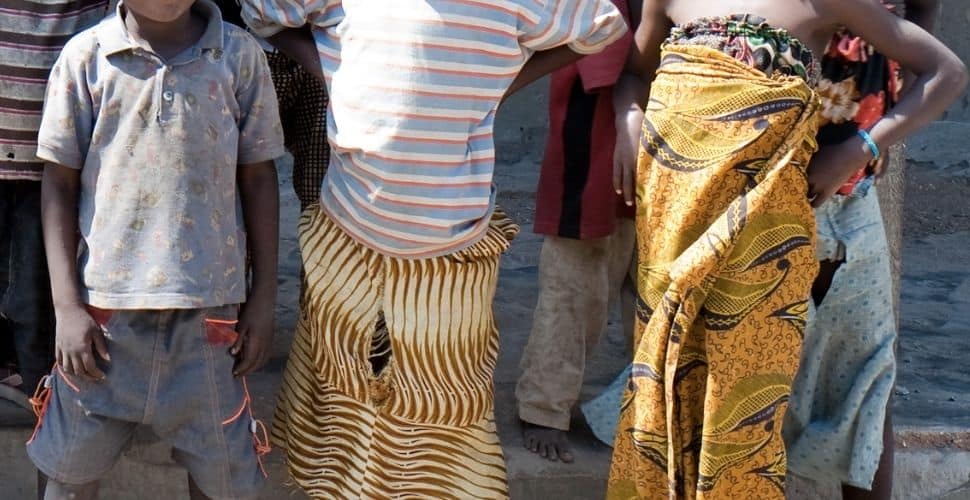Conditions in Haiti’s orphanages are notorious. Reports of forced labor, trafficking and abuse are widespread in these institutions that proliferated after the devastating 2010 earthquake and which are often privately run, raking in donations from abroad. Yet, an estimated 300,000 children still live in these harmful institutions, many of whom have parents or family members.
Social workers are fighting against this system. They are the driving force behind Haiti’s government’s efforts in recent months to shut down these orphanages and work to reunite children with their families wherever possible. But it’s a herculean task in a country where many people don’t have a digital footprint, and addresses and telephone numbers aren’t readily available.
“Poverty orphans”
Haiti is the poorest country in the Western Hemisphere and one of the poorest countries in the world where over half of the 11 million population lives under the poverty line making less than $2 a day.
Many families struggling to provide for their children believe orphanages will be able to at least feed and house their children, however imperfectly. Orphanages are thus viewed as a temporary solution and are filled with what are known as “poverty orphans” – those children who still have family. Morgan Wienberg, co-founder and executive director of Little Footprints, Big Steps, an organization working to reunite children with their families said “When parents give up their kids to orphanages, they really don’t see it as giving their children up forever”.
But the reality facing children in these institutions is horrifying and often parents and family members are unaware of the conditions.
Following the catastrophic 2010 earthquake that killed an estimated 200,000 people and caused widespread destruction, the number of orphanages in Haiti ballooned by 150%. Along with them, instances of trafficking and forced labor spiked.
Dánica Coto at the Los Angeles Times reports:
Mylouise Veillard was 10 when her mother dropped her off at an orphanage in southern Haiti and promised her a better life. For three years, Mylouise slept on a concrete floor. When she was thirsty, she walked to a community well and hauled heavy buckets of water herself. Meals were scarce, and she lost weight. She worried for her younger brother, who struggled even more than she did at the facility.
[…]
One day, startled at the weight they’d lost, [their mother] decided to pick up the children with the help of social workers. She was convinced they’d be better off in grinding poverty than at the orphanage.
Social workers leading the way
Today, there are around 750 orphanages in the country. A 2018 study found that only 5% of these are operating at minimum standards, meaning that the government should close down the vast majority of these institutions.
Following renewed efforts from the Haitian government to shut down orphanages and halt construction of new institutions, social workers are undertaking the task of reunifying families wherever possible.
How? By walking up hills and navigating through neighborhoods often with little else than a photograph of the child, knocking on doors and asking if anyone recognizes the face in the picture. Social worker Jean Rigot Joseph explained that he would show children pictures of landmarks to see if they remember where they used to live.
It’s an arduous process made even more difficult by violence, gangs and threats from those opposed to the government’s plan to halt what is viewed as a lucrative business. Government officials have even been forced to go into hiding as they are seen as a threat to the flow of donations from abroad.
Reunification efforts have been successful in more rural parts of Haiti where gangs don’t have as much control and families can grow their own food.
In rural southern Haiti, some 330 children are now living again with their families.
Meaningful support for families
Once children are reunited with their families, the work to keep them together begins. Little Footprints, Big Steps is one organization in Haiti that provides support that can be life changing for families struggling with poverty and economic insecurity.
They built Mylouise’s mother, Estève, a house to give their family security. “Other efforts include hiring an agronomist to help families produce crops to eat or sell amid the crippling inflation that has pushed Haitians into even deeper poverty.”
Take action!
We know that the risk of trafficking and exploitation in orphanages is too high. Ask volunteer tour operators to stop offering volunteer placements in orphanages and help break the cycle of exploitation. Send them a message today!







Freedom United is interested in hearing from our community and welcomes relevant, informed comments, advice, and insights that advance the conversation around our campaigns and advocacy. We value inclusivity and respect within our community. To be approved, your comments should be civil.